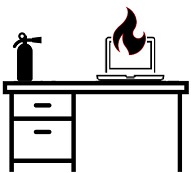[vc_row][vc_column][vc_column_text]When kids grow up, they do not want to be firefighters because they look forward to polishing or maintaining the engine. They want to fight the fires. A surprising statistic reveals that, as a class, firefighters are guilty of more arson than any other group.
Many of us, as managers, turn ourselves into firefighters. We may start fires simply by waiting until the last minute to get something done or creating an emergency when something isn’t (or at least didn’t have to be), by overemphasizing the importance of a situation.
In both instances, we have the opportunity to experience the thrill of being needed to put the fires out. These situations make us seem more important, are more exciting, and make us feel much more valuable.
This need for focus is not the need in the marketplace, the situation, or the company, but is the manager’s need to be important. We tend to falsely find ways of meeting this need.
Why aren’t the heroes in our system truly the ones who prevent the fires, who make small but constant improvements? Until we address this question successfully, most organizations will have their straws pointed in the wrong direction.[/vc_column_text][/vc_column][/vc_row][vc_row][vc_column][vc_column_text]
A Play on Words That’s Not Funny
When individuals are terminated, we say we “fire” the person. The manager who is really doing their job is in the business of preventing the necessity of firing anyone. The effective manager (firefighter) develops, communicates, and motivates so that people will have a burning desire to perform.[/vc_column_text][/vc_column][/vc_row][vc_row][vc_column][vc_column_text]
[/vc_column_text][/vc_column][/vc_row]

